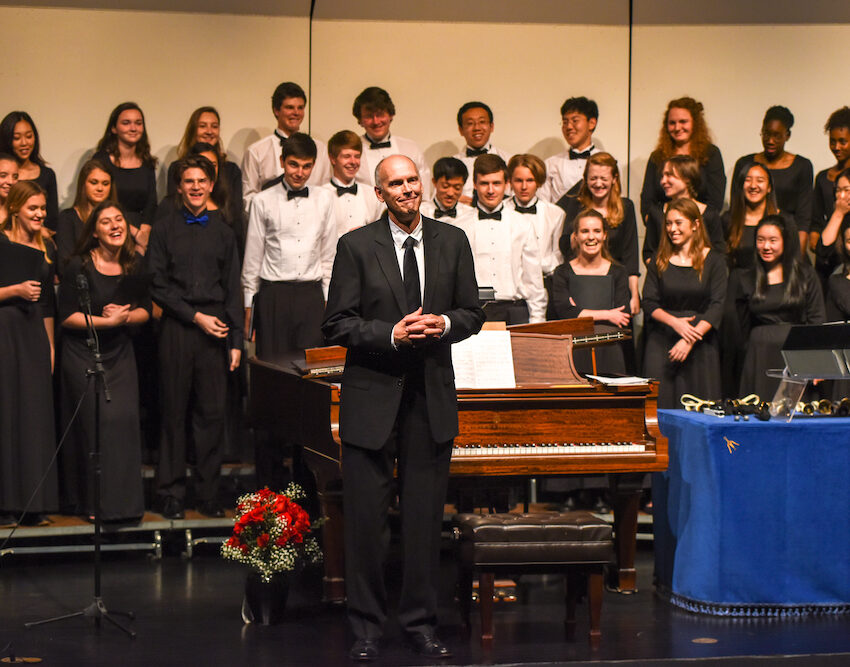
The 2022–2023 school year was the twenty-fifth for John Crawley, the Director of Music and Drama.
When did you first learn to play piano?
I began lessons when I was five. They say my fascination with the piano began at three. I didn’t really get serious (which also dovetailed with my finally getting a teacher who really nurtured my abilities) until I was a sophomore in high school and then I took off.
Where did you study music?
My parents were concerned about my ability to make a living as a musician so as a compromise, I went to Wheaton College in Illinois (which had a conservatory of music within their liberal arts program). However, after two years, I had achieved all I could there, so I transferred to the Eastman School of Music in Rochester, New York. After receiving my Bachelor of Music degree in piano performance, I knew that I wanted to hone my skills further as a collaborative pianist (accompanying and chamber music). At that time, there weren’t many schools that offered advanced degrees in collaborative piano, so I went to Temple University in Philadelphia, which was one of the first schools to create such a program. There I got my Master of Music in piano performance.
Who are some of your role models, in music, or in life?
My hero as a child was Beethoven. To create such moving music through such hardship is something that really resonates with me. The pianist I wanted most to be like was Arthur Rubinstein. I’ve always been fascinated by musicians who bring out colors in their instrument that defy the limitations of the instrument. My teacher at Eastman was that kind of player. She had complete control over the keyboard.
Why is it important to have time for music study (and practice) during the academic day (as opposed to squeezing it in the margins of everything else)?
Music is such an integral part of becoming fully human that I have always struggled with the fact that our country doesn’t place the same importance on music as it does other academics or athletics. So, to have Instrumental Ensemble meet during the academic day has been a joy. There are still students who put their instruments aside when they come here but for those who want to continue to hone their musical skills, I have fought hard to make those options a reality for them. As with any skill, consistency is key in mastering any art. Not having to compete for time with other school obligations has been a real boon for our instrumental program.
What piece of music have you been most inspired by in the last few years and why?
This past year I discovered the music of Florence Price and just fell in love with her musical vocabulary. I think that discovery was also helped by my delving so deeply into the music of George Gershwin for a show I did last summer. Opportunities arise in one’s career, and those opportunities take you in directions you can’t foresee if you are open to pursuing them.
What is your advice for incoming students who want to get involved with the music program?
It has been my goal for the past twenty-five years to make Asheville School a place where you can continue to pursue music at whatever level you’d like to do that. All it takes is to show up at the beginning of the year when Chorus, Handbell Ensemble, and Instrumental Ensemble begin rehearsals. Reach out to me and we will find a way for you to continue learning. Don’t let anyone ever tell you music isn’t an important part of your education or dispensable in any way. It’s simply not true. If music is a passion of yours, don’t let anyone keep you from following that truth.